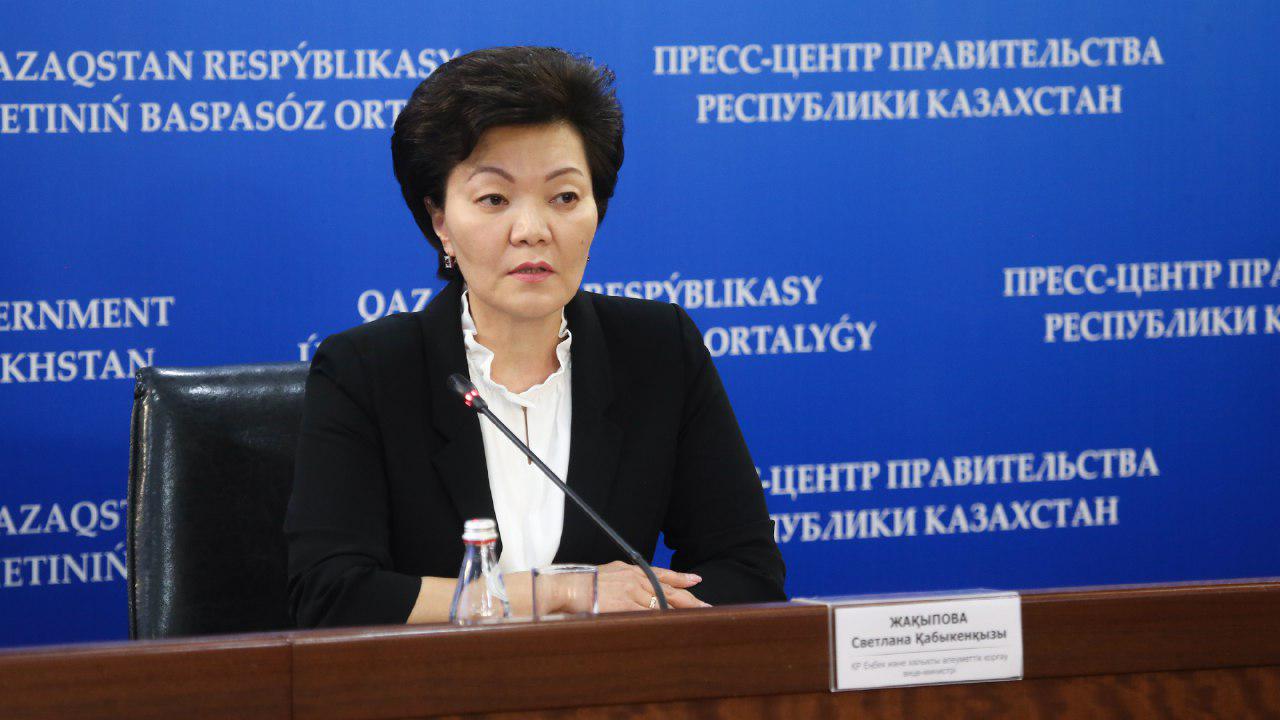19 June 2019, 17:53

June 19 at a briefing at the press center of the Government, Vice Minister of Labor and Social Protection of the Population Svetlana Zhakupova spoke about the innovations of the National Plan to ensure the rights and improve the quality of life of persons with disabilities in Kazakhstan until 2025.
The National Plan was designed to ensure the rights and improve the quality of life of persons with disabilities until 2025. The goal is to provide the strategy, composition and consistency of coordinated actions of all parties involved towards improving the quality of life and ensuring the rights of people with special needs.
“The very ideology of the National Plan is formed in such a way that no sphere can independently develop and be supported only in one direction. Because every sphere of life is with faces. In order to ensure the quality of life, the services provided, this National Plan was formed and adopted,” said Zhakupova.
The plan provides seven priority areas with the inclusion of 64 activities:
Within the framework of the first direction “Prevention of Disability,” a close cooperation and coordination with the Ministry of Healthcare is maintained.
“Today’s indicators suggest that this relationship must be continuous. For example, even for the prevention and rehabilitation. If our rehabilitation today turns out to be only protection bodies in the form of sanatorium-resort treatment, now the National Plan provides for continuity of rehabilitation even at the level of outpatient, inpatient and sanatorium-resort treatment,” explained Zhakupova.
Also such activities as expansion of the list of diseases for which screening is carried out with a view to early intervention in identifying and preventing the disease itself have been identified. These multidisciplinary teams must work in a coordinated manner in order to prevent the burden of the disease itself, the consequences and disability.
In the framework of the second direction “Accessibility of education,” according to Zhakupova, work will be carried out to ensure the accessibility of educational organizations for children. To date, only 4 thousand educational organizations out of 7 thousand are ready to accept children with special needs. At the same time, the vice minister stressed that the National Plan will pay attention to creating a certain educational base for children, taking into account their special needs.
“Together with the Ministry of Education, we will pay special attention to educational programs, the training of teaching staff so that they can work with children with special needs, the creation of institutional frameworks, such as online training,” said Zhakupova.
Today in Kazakhstan more than 15 thousand children study at home. In order to socialize these children and enable them to study in schools, the ministry, together with the Ministries of Education and Science and Health, plans to develop a list of diseases for which homeschooling will be shown and the need and ability of the child to study in the classroom are determined accordingly. If there is an opportunity to study in a class, these children will go to school like all other children, but if the child does not have such an opportunity, he will be granted the right to participate in the educational process remotely. This reform will be implemented at all levels of education.
In the third direction “Comprehensive accessibility and barrier-free environment” this year more than 1,300 objects will be adapted to the needs of people with disabilities.
“Since 2015, our ministry has implemented an Accessibility Map. On this map, we have more than 31 thousand objects that have already been certified and, accordingly, more than 20 thousand objects have a certain degree of accessibility. In the future, 21 thousand objects must be adapted. The task is to adapt more than 1,300 objects this year,” said Zhakupova.
The fourth direction “Economic independence and high-quality employment” includes measures for the vocational guidance of people with special needs, quality support for employment and stimulation of employers.
As of Jan. 1, 2019, more than 27% or 111.5 thousand disabled people out of 411 thousand people with disabilities of working age are employed (there were deductions at least once during the year). Centers for vocational guidance and rehabilitation of people with special needs will be created, support for people with disabilities in employment will be introduced. Mentors will help to adapt to the work process, guide and assist when necessary. In addition, the subsidization of the employer's expenses for the creation of special jobs for the employment of persons with disabilities will be continued.
The fifth direction “Improving the efficiency of social rehabilitation and habilitation” is aimed at ensuring the full integration of persons with disabilities, within the framework of which an integrated approach to social rehabilitation and habilitation of people with special needs will be implemented.
The sixth direction "Modernization of social services" will improve the quality of social services through the effective interaction of social services. An integrated model for the provision of social services will be introduced, when an interdepartmental team of social workers from different spheres will provide the service in an integrated manner.
The seventh direction “Modernization of public consciousness” is aimed at developing an image of a person with special needs as a full participant in the life of society.
In general, the implementation of the National Plan will make it possible to comprehensively address the issues of ensuring the rights and improving the quality of life of our citizens with disabilities.
Stay updated about the events of the Prime minister and the Government of Kazakhstan - subscribe to the official Telegram channel
Subscribe